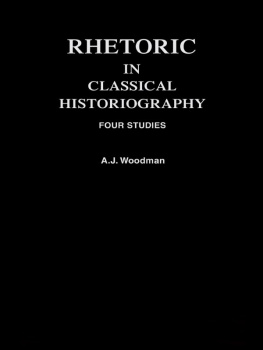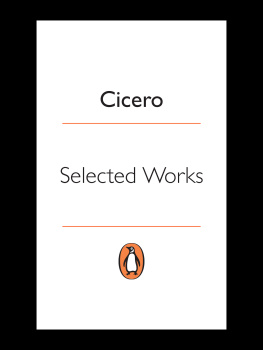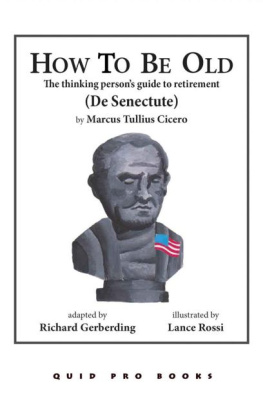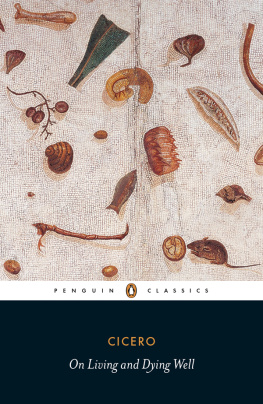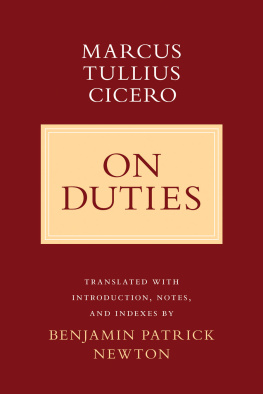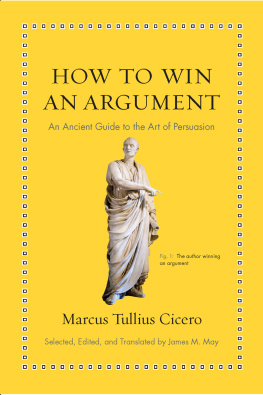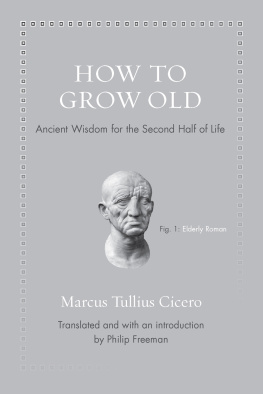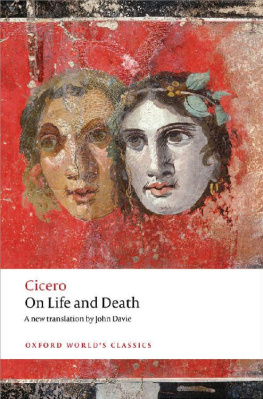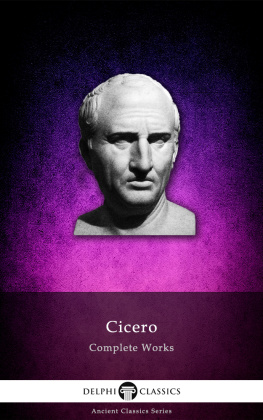Cicero Marcus Tullius - Rhetoric in classical historiography: four studies
Here you can read online Cicero Marcus Tullius - Rhetoric in classical historiography: four studies full text of the book (entire story) in english for free. Download pdf and epub, get meaning, cover and reviews about this ebook. City: London, year: 2004;2011, publisher: Routledge, genre: Science. Description of the work, (preface) as well as reviews are available. Best literature library LitArk.com created for fans of good reading and offers a wide selection of genres:
Romance novel
Science fiction
Adventure
Detective
Science
History
Home and family
Prose
Art
Politics
Computer
Non-fiction
Religion
Business
Children
Humor
Choose a favorite category and find really read worthwhile books. Enjoy immersion in the world of imagination, feel the emotions of the characters or learn something new for yourself, make an fascinating discovery.
- Book:Rhetoric in classical historiography: four studies
- Author:
- Publisher:Routledge
- Genre:
- Year:2004;2011
- City:London
- Rating:4 / 5
- Favourites:Add to favourites
- Your mark:
- 80
- 1
- 2
- 3
- 4
- 5
Rhetoric in classical historiography: four studies: summary, description and annotation
We offer to read an annotation, description, summary or preface (depends on what the author of the book "Rhetoric in classical historiography: four studies" wrote himself). If you haven't found the necessary information about the book — write in the comments, we will try to find it.
Cicero Marcus Tullius: author's other books
Who wrote Rhetoric in classical historiography: four studies? Find out the surname, the name of the author of the book and a list of all author's works by series.
Rhetoric in classical historiography: four studies — read online for free the complete book (whole text) full work
Below is the text of the book, divided by pages. System saving the place of the last page read, allows you to conveniently read the book "Rhetoric in classical historiography: four studies" online for free, without having to search again every time where you left off. Put a bookmark, and you can go to the page where you finished reading at any time.
Font size:
Interval:
Bookmark:

CLASSICAL
HISTORIOGRAPHY
FOUR STUDIES

1988 A.J.Woodman
British Library Cataloguing in Publication Data
Routledge is an imprint of the Taylor & Francis Group
This edition published in the Taylor & Francis e-Library, 2004.
Woodman, A.J.
Rhetoric in classical historiography
1. RomeHistoriography 2. Greece
Historiography
I. Title
907'.2037 DG205
ISBN 0-7099-5256-2 (Print Edition)
Published in the USA in 1988 by
Areopagitica Press
ISBN 0-203-48053-8 Master e-book ISBN
ISBN 0-203-78877-X (Adobe eReader Format)
ISBN 0-918400-07-4 (Print Edition)
To Dorothy
ficta uoluptatis causa sint proxima ueris
No discussion of classical historiography can proceed very far before encountering the two contradictory beliefs which R.F. Atkinson mentions in his book Knowledge and Explanation inHistory (1978):
From outside one tends to think of history as continuing from classical times to the present day; but many professional historians seem rather to think that their subject underwent a major change around the beginning of the nineteenth century. It may even be thought that history proper began about that time. (p. 14)
Among classical scholars it is, somewhat paradoxically, professional historians who tend to hold the former view, the latter being held by literary specialists. Yet despite the conceptual chasm which separates them, neither group argues its case. Literary scholars, whose principal concern is not usually with historical texts, feel no need to do so, while most historians seem constitutionally opposed to all questions of historiographical theory and, if pressed, take refuge in allusions to the authority of Thucydides and Cicero.
It is true that Thucydides holds a unique and formidable position in any debate concerning classical historiography. On the evidence of his preface and narrative alike he is commonly believed to have intended and produced the equivalent of a modern work of scientific history. In his conception of what is required of a writer of history, runs a typical comment, he is nearer to the twentieth century AD than he is to the fifth BC. Yet in the first Study I point to some of the obvious practical difficulties involved in writing narrative history, and I question whether Thucydides preface and its famous statements of method are in fact to be understood in the ways which are commonly supposed. Similarly the narrative itself, when one of its most admired sections is analysed in detail, is shown to have different qualities from those associated with scientific history. I am of course aware that numerous other scholars in recent years have queried the reputation which Thucydides has traditionally enjoyed, but there is clear and ample evidence that his work still suffers from widespread and mistaken preconceptions. If I have asked some of the right questions (and even if I have not always suggested the right answers), it becomes more likely that one can investigate other areas of classical historiography on their own terms and without risking the automatic response: But what about Thucydides?
Antonius speech in Book 2 of Ciceros De Oratore is just such an area. In this speech, which is our fullest and most important Roman source for the theory of classical historiography, Cicero is assumed by scholars to have put forward criteria for historical writing with which all modern historians would agree. Indeed, a distinguished modern historian and classical scholar has recently stated that Cicero is not expressly advocating a type of historical exposition different from that commonly employed by modern political historians. Yet in the second Study I demonstrate that such assumptions are based on an equal disregard for the context and the argument of the passage. When analysed in detail, Antonius observations are revealed to derive wholly from rhetorical prescriptions for the invention of material (inuentio) which were fundamental to forensic oratory in the ancient world. If my analysis is correct, it means that there is no theoretical basis what-soever for the view that classical historiography resembles its modern namesake. Historiography was regarded by the ancients as not essentially different from poetry: each was a branch of rhetoric, and therefore historiography, like poetry, employs the concepts associated with, and relies upon the expectations generated by, a rhetorical genre.
An example of this phenomenon is the style in which history is written. Cicero had prescribed what he considered the appropriate style, but his younger contemporary Sallust, while illustrating many of the great orators other historiographical prescriptions, signally failed to implement those which relate to style. In the third Study I argue that style was used by historians to denote the attitude which they adopted towards their material. Sallust, writing recent history in a time of civil war, was unable to adopt the kind of optimistic attitude which Cicero had taken for granted, but instead preferred to be seen as imitating the critical attitude associated with his stylistic model, Thucydides. Livy, writing later, is generally thought to have reacted against Sallust and returned to the ideals of Cicero; but a close analysis of his preface reveals that he too was writing during the civil wars and thus had no more cause than Sallust for optimism. On the contrary, his original plan was to contrast a Sallustian treatment of Romes decline with a Ciceronian account of the glorious early republic. Yet since Livys long career lasted the length of Augustus principate, he had the opportunity of appreciating the practical benefits of the Augustan programme, to which he became an enthusiastic convert. This conversion is demonstrated by the change which he introduced into the plan of his history, extending it to deal with Augustus reign in the same encomiastic style which he had used for the early republic.
Both Sallust and Livy were available for imitation by subsequent Roman historians, and it has often been thought that Sallust proved the more popular choice; yet the political atmosphere of the first century AD was such that Sallustian pessimism was dangerously open to misinterpretation and hence best avoided. Even Tacitus in the preface to his Histories, as I show in the fourth Study, did not openly espouse the style and attitude of Sallust but instead was more concerned to emphasise that his work exhibited all the exciting topics and dramatic techniques which had been prescribed for historiography by Cicero. Tacitus begins the Annals, however, by calling attention to his Sallustian style; and though in the narrative of Book 1 he gives every impression of trying to repeat the success story of the Histories (thereby providing an excellent example of classical historiography in action), this turns out later to be merely a device designed to shock readers out of their complacency. In Book 4 he maintains that, given the nature of Tiberius reign, he is unable to write history at all in the conventional sense but has been compelled to adopt an alternative format. Yet this too turns out to be a device, since Tacitus subsequently resorts to the further alternative of metahistory, in which he provides, in a metonymic or metaphorical form, precisely the elements of conventional historiography which he had earlier professed to exclude.
Font size:
Interval:
Bookmark:
Similar books «Rhetoric in classical historiography: four studies»
Look at similar books to Rhetoric in classical historiography: four studies. We have selected literature similar in name and meaning in the hope of providing readers with more options to find new, interesting, not yet read works.
Discussion, reviews of the book Rhetoric in classical historiography: four studies and just readers' own opinions. Leave your comments, write what you think about the work, its meaning or the main characters. Specify what exactly you liked and what you didn't like, and why you think so.

